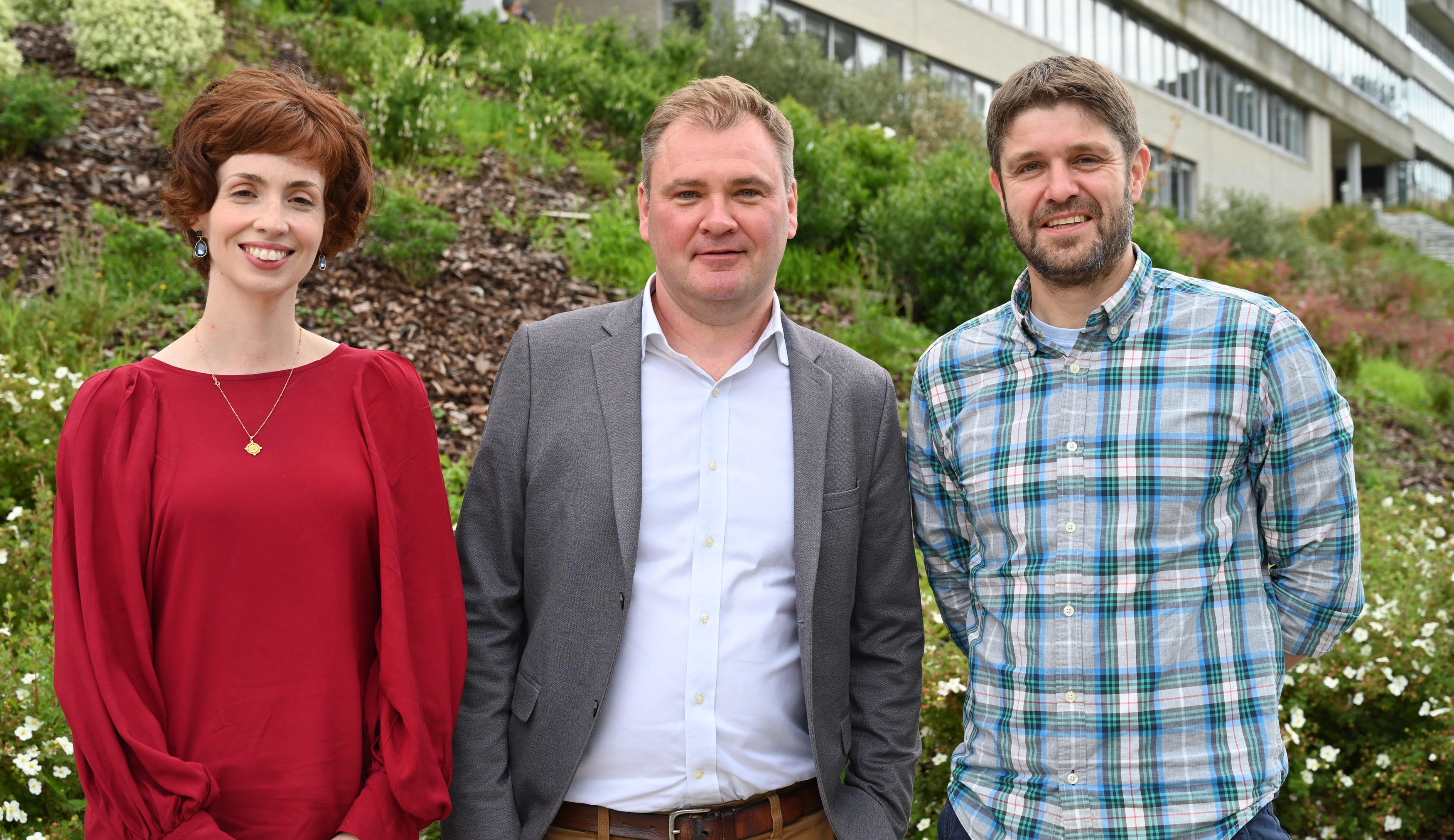Keir Starmer yn dweud y dylai mewnfudwyr ddysgu Saesneg er mwyn integreiddio. A yw’n bod yn deg?

O'r chwith i'r dde: Dr Gwennan Higham o Brifysgol Abertawe, yr Athro Leigh Oakes o Brifysgol y Frenhines Mary yn Llundain a Dr Huw Lewis o Brifysgol Aberystwyth.
10 Mehefin 2025
Wrth ysgrifennu yn The Conversation, mae Dr Huw Lewis o’r Adran Gwleidyddiaeth Ryngwladol a'i gyd-awduron yn trafod moeseg integreiddio ieithyddol, a sut y gall tegwch olygu bod rhwymedigaeth ar lywodraeth neu gymdeithas, yn ogystal ag ar fewnfudwyr:
The UK government’s proposed immigration reforms emphasise the need for migrants to learn English in order to integrate successfully.
Some of the new measures announced include raising the level of English language skills required from migrants that wish to work in the UK.
Those who wish to settle permanently will also need to demonstrate a stronger grasp of English. In the future they may also be asked to demonstrate how their command of the language has improved since they arrived.
Since the New Labour years, successive UK governments have justified the link between learning English and integration by appealing to British values, social mobility or even national security and anti-extremism.
Yet in a press conference to launch the reforms, Keir Starmer adopted a different line. He argued that linguistic integration should be viewed as a matter of “fairness”.
“When people come to our country, they should also commit to integration, to learning our language, and our system should actively distinguish between those that do and those that don’t,” Starmer said. “I think that’s fair.”
In linking learning English with fairness, Starmer seems to be making a claim about the ethics of linguistic integration. However, his remarks frame this as a one-sided deal. Migrants must meet English language requirements to earn the right to stay in the UK.
No mention is made of the possibility that fairness in this context may also entail an obligation on government, or society more broadly, to take steps to ensure that learning English is a practical option for all migrants.
The government’s proposed reforms related to learning English adopt a similar approach. They include a series of steps that will be taken to increase the level of English competence expected from those settling in the UK.
But aside from a vague commitment to improve access to English language classes, the government has not proposed detailed measures to help migrants to meet these language demands.
This is despite the fact that researchers and practitioners working in the field of language education for migrants have long argued that access to learning English for speakers of other languages is highly uneven and chronically underfunded.
It is not unreasonable for a society to set out certain broad obligations for migrants as part of the integration process, such as learning a common public language. This is now relatively common across many European democracies.
What’s more, for those who settle in the UK from countries where English is not spoken, acquiring the language will support efforts to enter the labour market and simplify the challenge of navigating new health, social security, housing and education systems.

However, if Keir Starmer is concerned with fairness, then he should arguably consider how integration can be understood as a two-way process. This would mean acknowledging that there are roles and responsibilities for the government and citizens of the host society, as well as for migrants.
This is particularly relevant when considering the role of language in integration because applied linguistic research shows that second-language acquisition can be a difficult task. Success varies according to factors that are not necessarily within the control of individual learners, such as age, level of education and wealth.
Inclusive integration
More nuanced understandings of linguistic integration also stress that the process should not be viewed as one where the aim is for migrants simply to not stand out linguistically.
Rather, the aim should be to help migrants – many of whom may already be multilingual – to adjust their linguistic repertoires in a way that allows them to settle in their new communities.
Alongside opportunities to acquire languages deemed essential for employment and engagement with public bodies, this may also entail opportunities to access other languages that play a role in the social life of the host society.
For example, including the Welsh language as part of provision for speakers of other languages in Wales has been seen as a way to develop a distinct sense of belonging.
Furthermore, the process of linguistic integration should acknowledge the languages that migrants bring with them. As they build a new life, they should be afforded space to reflect on what role these languages will play in their social interactions.
This type of approach potentially offers a more inclusive route to linguistic integration. It affirms newcomers as valued members of society, not just as learners but also as contributors to the social and cultural life of their new communities.![]()
Huw Lewis, Uwch Ddarlithydd Gwleidyddiaeth Ryngwladol, Prifysgol Aberystwyth;
Gwennan Higham, Uwch Ddarlithydd Cymraeg, Prifysgol Abertawe
a Leigh Oakes, Athro o Ffrangeg a Llingwistiaeth, Prifysgol y Frenhines Mary yn Llundain
Mae'r erthygl hon wedi ei hailgyhoeddi o The Conversation dan drwydded Creative Commons. Darllenwch yr erthygl wreiddiol.
Am ragor o wybodaeth ewch i:Moeseg Integreiddio Ieithyddol



